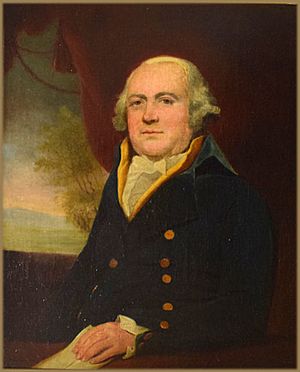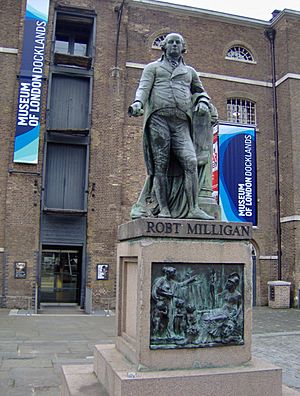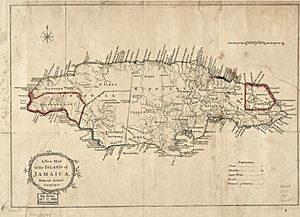Robert Milligan (merchant) facts for kids
Quick facts for kids
Robert Milligan
|
|
|---|---|

a Portrait of Milligan by Lemuel Francis Abbott
|
|
| Born | 19 August 1746 Dumfries, Scotland
|
| Died | 21 May 1809 |
| Nationality | Scottish |
| Occupation | Slave factor, plantation co-owner, landmark London docks construction committee |
| Years active | 1768-death |
| Known for | Having built the West India Docks |
|
Notable work
|
West India Docks, Poplar, Middlesex |
| Spouse(s) | Jean Dunbar |
| Children | 8 |
Robert Milligan (born August 19, 1746 – died May 21, 1809) was a Scottish businessman. He was a key person in building the West India Docks in London. These docks became very important for trade. Milligan also owned many enslaved people and was involved in the business of buying and selling them.
Contents
About Robert Milligan
Early Life and Business
Robert Milligan was born in Dumfries, Scotland, on August 19, 1746. From about 1768 to 1779, he worked as a merchant in Kingston, Jamaica. During this time, he was a partner in a company called Dick and Milligan. This company bought and sold enslaved people on the island. This was known as "slave factoring."
Milligan also worked with another Scottish merchant, George Forteath. By the time he left Jamaica in 1779, Milligan was an important member of the Jamaica chamber of commerce.
Moving to London
After leaving Jamaica in 1779, Milligan moved to London. In 1781, he married Jean Dunbar. They had eight children together: five boys and three girls.
By 1794, Milligan was a merchant in two London companies. These were Milligan and Allen and Milligan and Mitchell. The Milligan and Mitchell company owned land in Jamaica. By 1807, these lands had 526 enslaved people working on their sugar farms. These farms were in places like Kellet's and Mammee Gully.
In 1808, Milligan moved to a house in Hampstead. He died there on May 21, 1809, and was buried in the local churchyard.
Building the West India Docks
Why the Docks Were Needed
At the time, London's riverside wharves had many problems. Goods were often stolen, and ships faced long delays. Robert Milligan and other powerful businessmen were very upset about these issues. They decided to plan and build the West India Docks.
A New Trading Hub
The new docks were designed to have a special advantage. For 21 years, they would be the only place in London allowed to import goods from the West Indies. These goods included important products like sugar, rum, and coffee.
The first stone for the Docks was laid in July 1800. Milligan was the Deputy Chairman of the West India Dock Company at this time. Important people attended the ceremony, showing Milligan's strong connections. The stone was laid by Lord Chancellor Lord Loughborough and Prime Minister William Pitt the Younger. The Company chairman, George Hibbert, was also there.
The Docks officially opened just over two years later, in August 1802. Milligan later became the Chairman of the Company.
Robert Milligan's Memorial

The Statue's History
To show their thanks for Milligan's role in creating the West India Docks, the company's directors and owners decided to put up a statue of him. They voted for it without anyone disagreeing. The statue was placed outside the dock offices and was shown to the public in 1813. It was made by a sculptor named Richard Westmacott.
The Statue's Removal
For many years, the statue stood in front of the Museum of London Docklands. However, on June 9, 2020, the local government removed it. This decision was made to "recognise the wishes of the community." It happened after another statue, that of Edward Colston, was removed in Bristol by people protesting against racism. This was in response to the murder of George Floyd.
Milligan Street
There is also a street named after Robert Milligan. Milligan Street is located near Westferry DLR station, close to Narrow Street in Limehouse.
See also
- List of monuments and memorials removed during the George Floyd protests
- List of public statues of individuals linked to the Atlantic slave trade
 | Bayard Rustin |
 | Jeannette Carter |
 | Jeremiah A. Brown |


